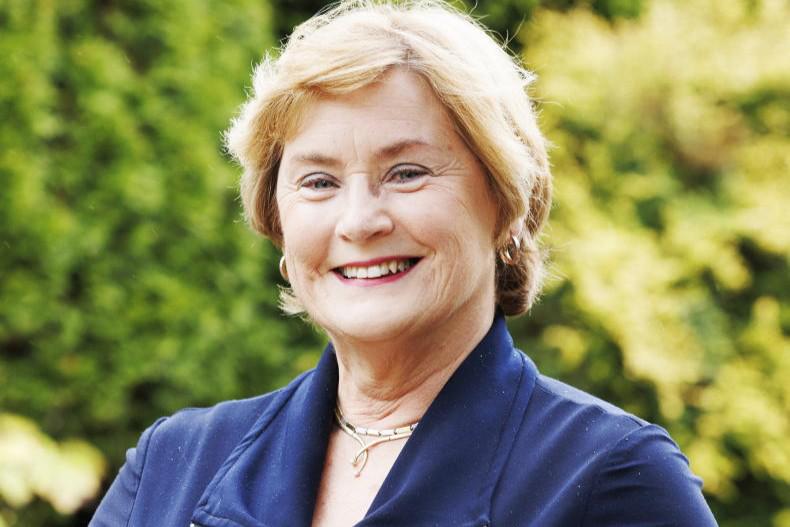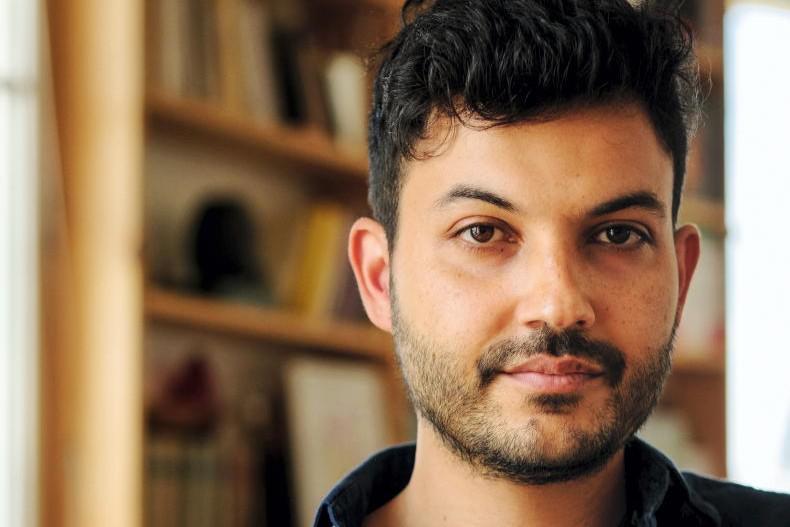Best-selling author Ann Cleeves jokes that she has always been nosey about people and what makes them who they are. Place is a big part of that for her, and it’s a common theme across her crime novels or the TV adaptations of her most famous creations, like Vera or Shetland or the Two Rivers series. In fact, the setting in each is almost like another captivating and wild character in her mysteries.
The award-winning writer, who The Guardian described as “the best living evoker of landscape”, is looking forward to “exploring Clare” when she visits on 7 March for Ennis Book Club Festival, where she will be in conversation with writer Brian McGilloway about her journey.
A rural person at heart, Ann says she lived in a city once for three months and hated it. She is chatting to Irish Country Living from her home in Whitley Bay, in the North Tyneside countryside in northeast England, close to the setting of one of her most famous creations, Vera. The popular detective character was brought to life by the inimitable Brenda Blethyn for 14 series on ITV before ending last month.
“I went onto the set for the last couple of days because Brenda and I are quite good friends now. She’s been playing the role for a long time,” she says, laughing. “It’s 14 years she’s been doing it. So, yes, it was quite emotional.
“On Saturday night, she and I were at the Regional Royal Television Society dinner, and we both got an achievement award for working on Vera for that length of time, so that was great,” adds Ann.
Asked why she believes Vera resonated with so many people, Ann replies, “When the show was first made, there weren’t that many shows with women of a certain age as the hero, and it’s not about her husband or her family or what she’s wearing or her love life.
“It’s just her being competent and authoritative. I think people quite liked that, and the wonderful background of Northumberland helped as well.”
“My daughter is an academic, and she’s a human geographer, and her research is all about the individual within their community and their landscape. I think we are very much a product of where we live and where we are brought up,” observes Ann, who has sold over six million books worldwide.
Shetland
Her journey started growing up in the North Devon countryside before going to university to study literature. She later dropped out after meeting somebody in a pub and hearing of a cooking job on a bird observatory in Shetland, the remote Scottish islands.
“It just sounded like an adventure. I couldn’t cook, and I didn’t know anything about birds, and they were fairly desperate,” she says, chuckling, adding that she later fell in love with the island.
“I was reading anything I could get my hands on because there was no telly, but there were lots of stories, so I’d go down the island chatting with people, getting lots of gossip.”
She spent two seasons working there, making many friends and this resulted in her going back again and again to visit. Ann also met her late husband Tim, a visiting ornithologist, on Shetland, and they married a short time after.
The couple later moved to Hillbre, a tiny tidal island nature reserve in the Dee estuary in northwest England, where the pair were the only residents. Both were auxiliary coastguards at the time, and Ann was training to be a probation officer.
With no mains water or electricity and limited access to the mainland, there was little to do, and it was here Ann started writing early in the mornings, something she continued when she had two young children and right to this day. “I’m no good after lunchtime, I haven’t a creative bone in my body [then],” she says.
Initially, Ann thought she’d write a work of “great literary genius” but realised her strength was in characters rather than plotting. The crime fiction structure offered a plot, a start, and an end point. It also gave her “the liberty to do all sorts of other things” like “look at how they [characters] grow out of their communities or what makes families hang together or pull apart.”
I did meet murderers because I supervised people on licence, so I did go into prisons, but they were mostly little inadequate men you wouldn’t want to write about
At that time probation officers were like social workers in court, Ann explains. She admits it’s probably her curiosity about people that led her down that path, and it certainly fed into her stories.
“It allowed me to ask all sorts of intrusive questions of the family of offenders or people who had been sentenced.
“I did meet murderers because I supervised people on licence, so I did go into prisons, but they were mostly little inadequate men you wouldn’t want to write about.”
Her crime stories are more about the lives of flawed and complex characters caught up in extreme life events rather than the murderer, she says.
“The Dark Wives, my most recent book, came about because I got very angry hearing a radio documentary about private care homes and how much money private equity funds were making out of these troubled teenagers.”
A prolific writer, she has published a book a year since 1986, but amazingly for 20 years she was very much under the radar and holding down a day job at the same time. That all changed in 2006, when she won the Gold Dagger award, which is “like the Oscars of crime writing”, for her first Shetland book, Raven Black, following detective inspector Jimmy Perez.
Asked why that particular tome broke through, she say, “I think Shetland is about a place and it is so different to anywhere else in the UK really. The geography is so far north, it’s on the same line of latitude as bits of Greenland and closer to Bergen [Norway] than Edinburgh. I think maybe at the time Scandi noir was a big deal, and Shetland is as close to Scandi as you can get.”
Library advocate
A huge advocate for libraries, Ann sponsors the Reading for Wellbeing project in her region where, via social prescribing, people are brought into reading groups to combat mental health challenges and isolation. It has been a huge success in fostering connection in deprived and rural areas.
“It’s such an easy way to feel close to other people, and it’s a real confidence booster because it’s a place where you can disagree with absolutely everybody and still feel safe to do that. Nobody has the same idea about a book,” says Ann, who even started reading groups in several prisons.
“Some people love it [the book], and some people hate it, and it doesn’t matter. It’s about discussing and sharing ideas about it and getting passionate about [books].”
Fresh from a trip to a book festival in Barcelona, Ann, who is now widowed and a grandmother, concedes she is still “absolutely astonished” by her commercial success.
Her advice to wannabe crime writers is simple: “Just read a lot. Honestly, reading is the most important thing. That’s another reason why libraries are important because they don’t cost anything.
“I would say read the Maigret books [by Georges Simenon] because they are so spare [in terms of words] and he is so skilled at telling a good story. With one sentence he can set a scene, move the plot on and describe the character. He’s breathtakingly good.”
See ennisbookclubfestival.com

Author Ann Cleeves will visit Ennis Book Club Festival on 7 March.
Over 30 events delving into poetry, film, the art of the short story, and ageing in life and literature will take place as part of the Ennis Book Club Festival from 7 to 9 March.Highlights include a talk with Galway hurling great Joe Canning on 7 March, a books and buns quiz the following day, along with an event Remembering Edna O’Brien featuring Andrew O’Hagan, Danielle McLaughlin, Eoin McNamee and Sally Hayden in conversation with writer and RTÉ’s Rachael English. Famed author Ian McEwan is in conversation with RTÉ’s Arena show presenter Sean Rocks at 8pm on 8 March.At 11am on Sunday, 9 March, there is a Sunday Symposium: International Conflict in a Globalised World hosted by RTÉ presenter Katie Hannon prior to a literary lunch event with Cónal Creedon and Mairead Hearne at 1.30pm.All events are ticketed. Go to ennisbookclubfestival.com or call Glór box office 065 6843103.
Best-selling author Ann Cleeves jokes that she has always been nosey about people and what makes them who they are. Place is a big part of that for her, and it’s a common theme across her crime novels or the TV adaptations of her most famous creations, like Vera or Shetland or the Two Rivers series. In fact, the setting in each is almost like another captivating and wild character in her mysteries.
The award-winning writer, who The Guardian described as “the best living evoker of landscape”, is looking forward to “exploring Clare” when she visits on 7 March for Ennis Book Club Festival, where she will be in conversation with writer Brian McGilloway about her journey.
A rural person at heart, Ann says she lived in a city once for three months and hated it. She is chatting to Irish Country Living from her home in Whitley Bay, in the North Tyneside countryside in northeast England, close to the setting of one of her most famous creations, Vera. The popular detective character was brought to life by the inimitable Brenda Blethyn for 14 series on ITV before ending last month.
“I went onto the set for the last couple of days because Brenda and I are quite good friends now. She’s been playing the role for a long time,” she says, laughing. “It’s 14 years she’s been doing it. So, yes, it was quite emotional.
“On Saturday night, she and I were at the Regional Royal Television Society dinner, and we both got an achievement award for working on Vera for that length of time, so that was great,” adds Ann.
Asked why she believes Vera resonated with so many people, Ann replies, “When the show was first made, there weren’t that many shows with women of a certain age as the hero, and it’s not about her husband or her family or what she’s wearing or her love life.
“It’s just her being competent and authoritative. I think people quite liked that, and the wonderful background of Northumberland helped as well.”
“My daughter is an academic, and she’s a human geographer, and her research is all about the individual within their community and their landscape. I think we are very much a product of where we live and where we are brought up,” observes Ann, who has sold over six million books worldwide.
Shetland
Her journey started growing up in the North Devon countryside before going to university to study literature. She later dropped out after meeting somebody in a pub and hearing of a cooking job on a bird observatory in Shetland, the remote Scottish islands.
“It just sounded like an adventure. I couldn’t cook, and I didn’t know anything about birds, and they were fairly desperate,” she says, chuckling, adding that she later fell in love with the island.
“I was reading anything I could get my hands on because there was no telly, but there were lots of stories, so I’d go down the island chatting with people, getting lots of gossip.”
She spent two seasons working there, making many friends and this resulted in her going back again and again to visit. Ann also met her late husband Tim, a visiting ornithologist, on Shetland, and they married a short time after.
The couple later moved to Hillbre, a tiny tidal island nature reserve in the Dee estuary in northwest England, where the pair were the only residents. Both were auxiliary coastguards at the time, and Ann was training to be a probation officer.
With no mains water or electricity and limited access to the mainland, there was little to do, and it was here Ann started writing early in the mornings, something she continued when she had two young children and right to this day. “I’m no good after lunchtime, I haven’t a creative bone in my body [then],” she says.
Initially, Ann thought she’d write a work of “great literary genius” but realised her strength was in characters rather than plotting. The crime fiction structure offered a plot, a start, and an end point. It also gave her “the liberty to do all sorts of other things” like “look at how they [characters] grow out of their communities or what makes families hang together or pull apart.”
I did meet murderers because I supervised people on licence, so I did go into prisons, but they were mostly little inadequate men you wouldn’t want to write about
At that time probation officers were like social workers in court, Ann explains. She admits it’s probably her curiosity about people that led her down that path, and it certainly fed into her stories.
“It allowed me to ask all sorts of intrusive questions of the family of offenders or people who had been sentenced.
“I did meet murderers because I supervised people on licence, so I did go into prisons, but they were mostly little inadequate men you wouldn’t want to write about.”
Her crime stories are more about the lives of flawed and complex characters caught up in extreme life events rather than the murderer, she says.
“The Dark Wives, my most recent book, came about because I got very angry hearing a radio documentary about private care homes and how much money private equity funds were making out of these troubled teenagers.”
A prolific writer, she has published a book a year since 1986, but amazingly for 20 years she was very much under the radar and holding down a day job at the same time. That all changed in 2006, when she won the Gold Dagger award, which is “like the Oscars of crime writing”, for her first Shetland book, Raven Black, following detective inspector Jimmy Perez.
Asked why that particular tome broke through, she say, “I think Shetland is about a place and it is so different to anywhere else in the UK really. The geography is so far north, it’s on the same line of latitude as bits of Greenland and closer to Bergen [Norway] than Edinburgh. I think maybe at the time Scandi noir was a big deal, and Shetland is as close to Scandi as you can get.”
Library advocate
A huge advocate for libraries, Ann sponsors the Reading for Wellbeing project in her region where, via social prescribing, people are brought into reading groups to combat mental health challenges and isolation. It has been a huge success in fostering connection in deprived and rural areas.
“It’s such an easy way to feel close to other people, and it’s a real confidence booster because it’s a place where you can disagree with absolutely everybody and still feel safe to do that. Nobody has the same idea about a book,” says Ann, who even started reading groups in several prisons.
“Some people love it [the book], and some people hate it, and it doesn’t matter. It’s about discussing and sharing ideas about it and getting passionate about [books].”
Fresh from a trip to a book festival in Barcelona, Ann, who is now widowed and a grandmother, concedes she is still “absolutely astonished” by her commercial success.
Her advice to wannabe crime writers is simple: “Just read a lot. Honestly, reading is the most important thing. That’s another reason why libraries are important because they don’t cost anything.
“I would say read the Maigret books [by Georges Simenon] because they are so spare [in terms of words] and he is so skilled at telling a good story. With one sentence he can set a scene, move the plot on and describe the character. He’s breathtakingly good.”
See ennisbookclubfestival.com

Author Ann Cleeves will visit Ennis Book Club Festival on 7 March.
Over 30 events delving into poetry, film, the art of the short story, and ageing in life and literature will take place as part of the Ennis Book Club Festival from 7 to 9 March.Highlights include a talk with Galway hurling great Joe Canning on 7 March, a books and buns quiz the following day, along with an event Remembering Edna O’Brien featuring Andrew O’Hagan, Danielle McLaughlin, Eoin McNamee and Sally Hayden in conversation with writer and RTÉ’s Rachael English. Famed author Ian McEwan is in conversation with RTÉ’s Arena show presenter Sean Rocks at 8pm on 8 March.At 11am on Sunday, 9 March, there is a Sunday Symposium: International Conflict in a Globalised World hosted by RTÉ presenter Katie Hannon prior to a literary lunch event with Cónal Creedon and Mairead Hearne at 1.30pm.All events are ticketed. Go to ennisbookclubfestival.com or call Glór box office 065 6843103.










SHARING OPTIONS